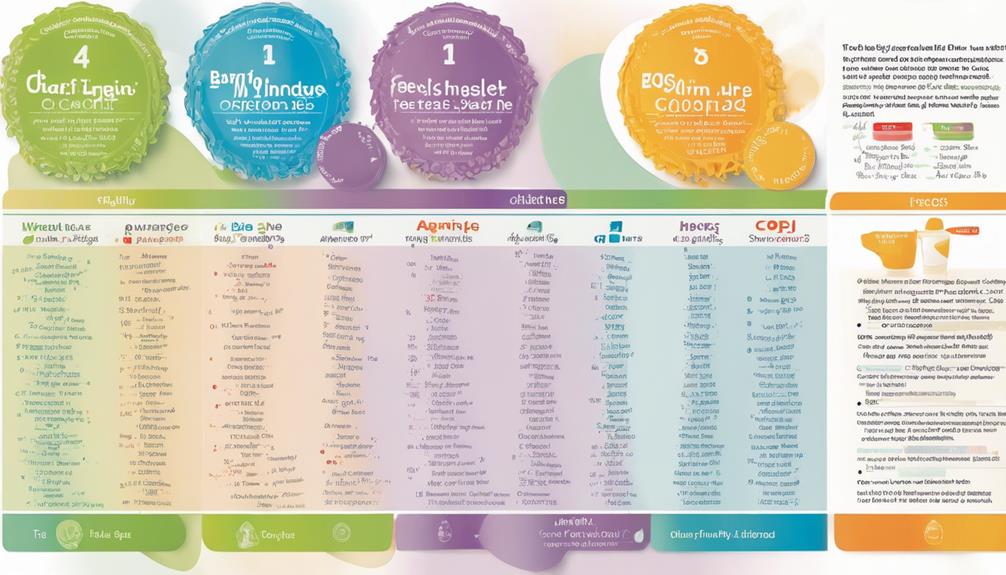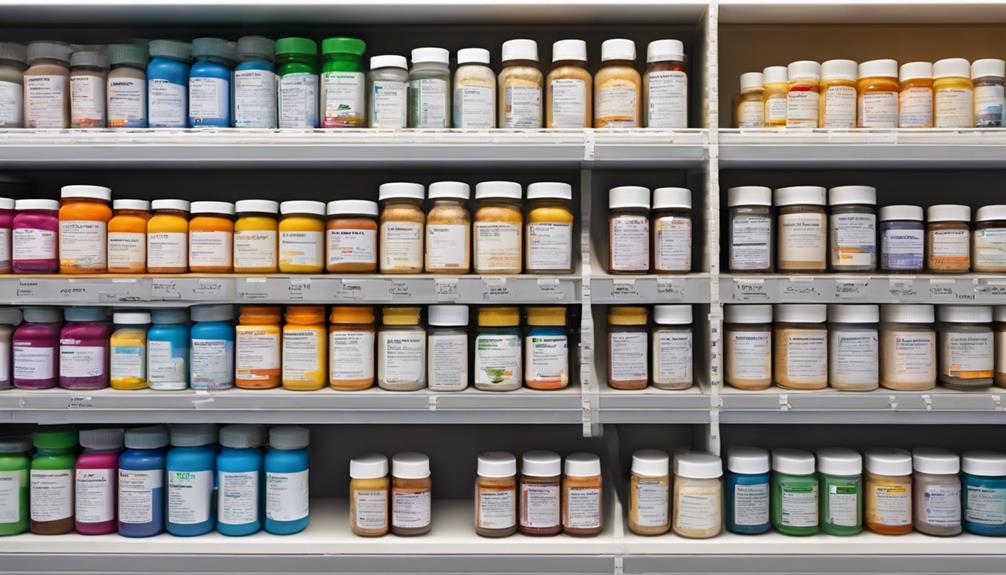As we navigate the intricate landscape of breastfeeding and dietary choices, imagine debunking ten common myths surrounding the consumption of Diet Coke during this pivotal time.
What impact does this fizzy drink truly have on your breastmilk and your little one? Let's unravel these misconceptions and shed light on the truth behind Diet Coke and breastfeeding.
Curious to uncover the real deal? Join us as we explore the facts and fiction surrounding this topic.
Key Takeaways
- Moderate Diet Coke consumption while breastfeeding is safe.
- Diet Coke does not significantly impact infant sleep patterns.
- No direct correlation between Diet Coke and infant colic.
- Nursing mothers can enjoy Diet Coke without major health concerns for their infants.
Caffeine Transfer to Breast Milk
When consuming Diet Coke while breastfeeding, a minimal amount of caffeine can transfer to breast milk, which is often less than what's present in the mother's bloodstream. Despite common breastfeeding myths, moderate caffeine intake, including from Diet Coke, is generally considered safe for nursing mothers.
Understanding that drinking Diet Coke in moderation is unlikely to have adverse effects on breastfed babies. The key lies in moderation and being mindful of the potential impact of caffeine on infants.
While some beliefs suggest otherwise, limiting caffeine intake while breastfeeding can help prevent potential irritability in babies. These misconceptions can lead to unnecessary worry for mothers who enjoy Diet Coke in moderation.
Impact on Baby's Sleep Patterns

When it comes to Diet Coke and breastfeeding, many wonder about its impact on a baby's sleep patterns. Evidence suggests that consuming Diet Coke in moderation while breastfeeding is unlikely to impact a baby's sleep quality or frequency of waking.
Factors like routine, environment, and hunger cues play a more substantial role in influencing a baby's sleep patterns than moderate consumption of Diet Coke by the breastfeeding mother.
Sleep Quality
How does Diet Coke consumption by breastfeeding mothers impact their baby's sleep patterns? Research indicates that moderate consumption of Diet Coke by breastfeeding mothers doesn't negatively affect their baby's sleep quality. Here are some important points to take into account:
- Breastfeeding mothers can enjoy Diet Coke in moderation without disrupting their baby's sleep patterns.
- Scientific studies have shown no direct link between Diet Coke intake during breastfeeding and poor sleep quality in infants.
- Babies of mothers who drink Diet Coke can still maintain regular and healthy sleep cycles.
- There's no evidence to suggest that moderate Diet Coke consumption affects the sleep patterns of breastfed infants.
- Enjoying Diet Coke in moderation while breastfeeding is unlikely to impact the quality of sleep for breastfed babies.
Frequency of Waking
In understanding the impact on baby's sleep patterns, frequent waking during the night is a natural aspect of infant sleep cycles influenced by various factors such as hunger, growth spurts, or discomfort. Babies may have varying night waking patterns based on individual needs and development stages.
It's common for breastfed babies to wake more frequently at night to nurse, aiding in the establishment and maintenance of milk supply. Responding to a baby's cues, following safe sleep practices, and establishing a calming bedtime routine can support their sleep.
Recognizing night waking as a normal part of infant sleep can help parents adjust and navigate their baby's sleep patterns effectively. Parents' understanding and acceptance play vital roles in fostering healthy sleep habits for their little ones.
Risk of Colic and Irritability
While some may speculate about a connection between Diet Coke consumption and increased colic or irritability in breastfed infants, current evidence doesn't support this claim. Colic and irritability in babies are influenced by various factors, and attributing them solely to a mother's Diet Coke intake oversimplifies the issue.
It's essential to approach concerns about colic and irritability holistically, considering multiple aspects of maternal and infant health, and seek personalized guidance from healthcare providers.
Colic Misconceptions
Despite common beliefs, there's no concrete evidence linking maternal consumption of diet Coke to an increased risk of colic or irritability in breastfed infants. Colic and irritability in babies can stem from various factors unrelated to the mother's diet, such as immature digestive systems or sensory sensitivities. Breastfeeding mothers can generally enjoy diet Coke in moderation without causing colic or irritability in their infants. It's important to take into account the overall health of both mother and baby, looking beyond diet Coke consumption when addressing colic or irritability in infants. Consulting a healthcare provider can help identify the underlying causes of colic or irritability in babies and offer suitable guidance for breastfeeding mothers.
Research doesn't support a direct link between maternal diet Coke consumption and colic.
Colic and irritability can have causes unrelated to maternal diet.
Moderation in diet Coke consumption is generally acceptable for breastfeeding mothers.
Considering overall health is crucial in addressing infant colic.
Healthcare providers can assist in identifying and managing colic in infants.
Irritability Factors
Understanding the multifaceted factors contributing to infant irritability, including the risk of colic, is essential for breastfeeding mothers seeking to optimize their baby's comfort and well-being. While Diet Coke consumption isn't directly linked to increased colic or irritability in infants, babies may react individually to maternal dietary choices.
Factors causing colic and irritability are complex, with Diet Coke not being a known trigger. Breastfeeding support groups can provide guidance on monitoring infant reactions to maternal diet. Breastfeeding mothers can generally consume Diet Coke in moderation without major concerns.
Scientific research hasn't firmly established a connection between Diet Coke and infant irritability, highlighting the importance of personalized observation and guidance. Joining a breastfeeding support group can offer valuable insights and reassurance on this topic.
Effect on Milk Supply

Research consistently shows that consuming Diet Coke while breastfeeding doesn't significantly impact milk supply. As a breastfeeding mother, it's natural to be concerned about what you consume and how it may affect your milk production. Here are some essential points to take into account regarding the effect of Diet Coke on milk supply:
- No Significant Impact: Studies haven't found a direct correlation between Diet Coke consumption and reduced milk production.
- Moderation is Key: Enjoying Diet Coke in moderation is generally deemed safe for breastfeeding mothers.
- Other Influencing Factors: Factors like hydration, nutrition, and overall health play a more significant role in milk supply than occasional Diet Coke intake.
- Balanced Diet Matters: Focusing on a well-rounded diet and staying adequately hydrated is important for ideal milk production.
- Occasional Consumption: It's more important to maintain a balanced diet than to worry about the occasional consumption of Diet Coke while breastfeeding.
Concerns About Artificial Sweeteners

Artificial sweeteners, particularly aspartame found in Diet Coke, raise concerns among breastfeeding mothers due to their potential impact on breastmilk composition. Despite aspartame being rapidly metabolized in the body into aspartic acid, phenylalanine, and methanol, studies show that maternal ingestion of aspartame does not lead to detectable levels of aspartame in breastmilk. However, excessive intake of aspartame may slightly elevate phenylalanine levels in breast milk, which can be of concern for fully breastfed infants. A prudent approach is advisable for nursing mothers with infants who have phenylketonuria, as aspartame intake could potentially affect phenylalanine levels in breastmilk.
| Concerns About Artificial Sweeteners | Impact on Breastmilk |
|---|---|
| Metabolized into aspartic acid, phenylalanine, and methanol | No detectable aspartame in breastmilk |
| Excessive intake may elevate phenylalanine levels in breastmilk | Slightly increased phenylalanine levels for fully breastfed infants |
| Prudent for nursing mothers with infants with phenylketonuria | Aspartame can affect phenylalanine levels in breastmilk |
Influence on Baby's Development

Taking into account the potential impact of maternal consumption of artificial sweeteners like aspartame on breastmilk composition, it's crucial to explore how this may influence the development of the baby. Research indicates that what a mother consumes while breastfeeding can directly affect the quality of her milk, potentially impacting her baby's overall growth and development.
When it comes to Diet Coke and its artificial sweeteners, particularly aspartame, here are some key points to take into account:
- Aspartame in breastmilk may lead to negative effects on cognitive function in infants.
- Higher intake of artificial sweeteners like aspartame could be linked to poorer cognitive outcomes in babies.
- Limiting Diet Coke consumption while breastfeeding might benefit the baby's cognitive health.
- Maternal consumption of low-calorie sweeteners may influence infant brain development through breastmilk.
- Babies exposed to aspartame through breastmilk might experience challenges in cognitive development.
These findings underscore the importance of being mindful of what's consumed while breastfeeding and its potential impact on the baby's development.
Myth of Increased Risk of Allergies

Is there a genuine connection between maternal diet soda consumption and an increased risk of allergies in breastfed infants? Studies haven't found a direct link between the two.
Breastfeeding itself offers vital immune protection and can actually help reduce the risk of allergies in infants.
The myth that diet soda consumption during lactation increases allergy risk lacks scientific support. Allergies in infants are influenced by a multitude of factors beyond just what the mother consumes.
Lactation consultants often advise that breastfeeding mothers focus on maintaining a balanced diet rather than fixating on specific foods as the cause of potential allergies in their infants.
It's essential for mothers to receive guidance from healthcare professionals, such as lactation consultants, who can provide evidence-based information to support their breastfeeding journey and the health of their babies.
Debunking Claims of Weight Gain

Shifting from the discussion on the myth of increased risk of allergies in breastfed infants, it's crucial to address the topic of debunking claims of weight gain associated with consuming Diet Coke while breastfeeding.
- Studies haven't shown a direct link between drinking Diet Coke while breastfeeding and weight gain.
- Weight gain is determined by overall caloric intake and expenditure, not specifically by consuming Diet Coke.
- Diet Coke is calorie-free and can be part of a balanced diet for breastfeeding mothers.
- Moderation is key when consuming Diet Coke or any other beverage while breastfeeding.
- Breastfeeding mothers should focus on a varied and nutritious diet rather than singling out specific foods or drinks like Diet Coke.
Understanding that weight gain is a complex process influenced by various factors, solely blaming Diet Coke oversimplifies the issue. By maintaining a balanced diet, including certain foods in moderation, and staying mindful of overall caloric intake, breastfeeding mothers can enjoy a can of Diet Coke without the undue fear of weight gain.
Addressing Dental Health Misconceptions

Let's investigate dispelling misconceptions surrounding dental health and the consumption of Diet Coke while breastfeeding. Drinking Diet Coke while breastfeeding does not directly harm dental health, but it is important to be mindful of its potential effects on teeth. Carbonated drinks like Diet Coke can contribute to tooth enamel erosion over time. However, dental health is a holistic matter influenced by overall diet and oral hygiene practices, not solely by one beverage. To highlight this point clearly, let's consider the following table:
| Misconception | Fact |
|---|---|
| Diet Coke consumption leads to immediate dental issues | Dental health is a cumulative result of various factors. |
| Breastfeeding while consuming Diet Coke harms baby's teeth | Baby feeds do not directly link to maternal Diet Coke intake. |
| Only Diet Coke affects dental health | Overall diet and oral hygiene practices play significant roles. |
| Brushing teeth immediately after consuming Diet Coke is enough | Regular dental check-ups are important for maintaining good dental health. |
| Diet Coke is the sole culprit for tooth decay | Limiting sugary and acidic drinks contributes to better dental health. |
Clarifying Impact on Mom's Health

Addressing the impact on maternal health, it's important to understand the metabolism of aspartame from diet drinks like Diet Coke during breastfeeding. Aspartame is rapidly metabolized in the body, and maternal ingestion of aspartame doesn't lead to detectable levels in breastmilk. However, large intake of aspartame can slightly increase phenylalanine levels in breastmilk, as evidenced by a study where six lactating women showed increased phenylalanine levels in breastmilk after aspartame ingestion. This means that fully breastfed infants may receive slightly elevated phenylalanine levels from maternal aspartame intake.
- Aspartame is rapidly metabolized in the body.
- Maternal ingestion of aspartame doesn't lead to detectable levels in breastmilk.
- Large intake of aspartame can slightly increase phenylalanine levels in breastmilk.
- Six lactating women showed increased phenylalanine levels in breastmilk after aspartame ingestion.
- Fully breastfed infants may receive slightly elevated phenylalanine levels from maternal aspartame intake.
Frequently Asked Questions
Is It Safe to Drink Diet Coke While Breastfeeding?
Yes, it's safe to enjoy Diet Coke while breastfeeding. Aspartame in Diet Coke is rapidly metabolized and does not pose risks to breastfed infants. Consult healthcare providers for personalized advice, but typical consumption is considered safe.
Does Aspartame Cross Into Breast Milk?
Yes, aspartame can slightly increase phenylalanine levels in breast milk based on studies. Despite this, it is metabolized and does not transfer significantly into breast milk. Moderation is key for breastfeeding individuals consuming aspartame-containing products.
How Long Should I Wait to Breastfeed After Drinking Coke?
We can breastfeed immediately after drinking Coke, as waiting is unnecessary. Moderate caffeine from Coke enters breastmilk minimally. It's generally safe for breastfeeding. Enjoying a Coke while nursing shouldn't pose issues for most babies.
What Foods Make Breastfed Babies Gassy?
Certain foods like dairy, cruciferous veggies, beans, fruits, spicy foods, caffeine, and artificial sweeteners can make breastfed babies gassy. Keeping a food diary can help pinpoint triggers. Consulting a healthcare provider or lactation consultant is essential for addressing concerns.
Conclusion
Crucially, the myths surrounding Diet Coke consumption while breastfeeding have been debunked to provide accurate information for nursing mothers.
However, there's one vital aspect that hasn't been addressed yet. Stay tuned for our next article where we explore the potential impact of caffeine in Diet Coke on breastfeeding babies and how to navigate this aspect of your diet while breastfeeding.
Stay informed and empowered on your breastfeeding journey!









